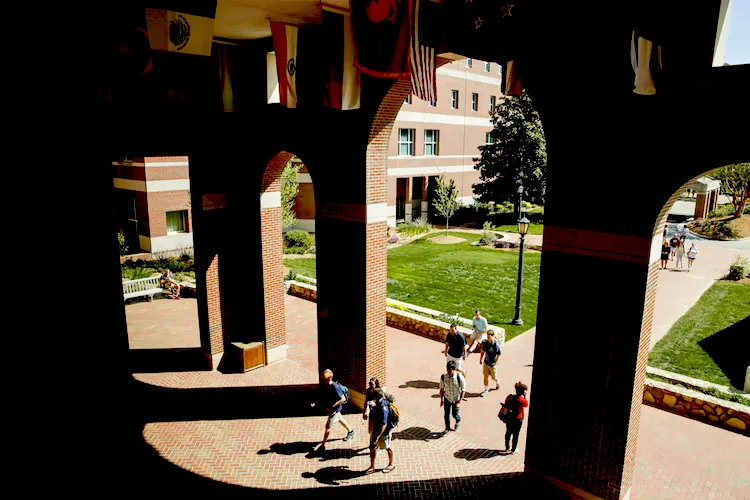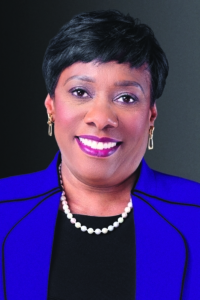
Kenan-Flagler Business School was one of the defendants in the two affirmative action cases before the Supreme Court
NEA PRESIDENT: HIGH COURT ‘HAS REINFORCED’ BARRIERS TO HIGHER ED

Becky Pringle:
Reaction to the pair of rulings was swift across the higher education landscape.
“Most of us want a country, schools, and a future that includes all of us and where we all belong,” National Education Association President Becky Pringle said in a statement. “But for too long, color-coded barriers have been used to prevent Black, brown, and Indigenous people from accessing the opportunities we all deserve and seek to achieve our dreams. With this decision, the Supreme Court has reinforced those barriers.
“Racism and discrimination are not just artifacts of American history but continue to persist in our society, including our schools, colleges, and universities. Affirmative action and programs like it expand higher education opportunities to those who have been historically denied a fair shot. When we ensure the many talents and experiences of students of color aren’t overlooked in admissions processes that tend to be biased against them, we create schools, a country and a future that includes us all. NEA remains committed to that work and calls on institutions of higher education and K-12 schools to redouble their efforts to ensure that our educational institutions support all students equally and equitably.
“We are stronger when our country, communities, schools, and future includes and reflects all of us. Today’s decisions by an out-of-touch and hyper-conservative Supreme Court are yet more evidence that the court is not working for all of us. The White House and Senate must hold the Supreme Court to the same laws and standards as the rest of us. And the White House and the Senate must continue to fill all judicial vacancies with qualified, fair-minded individuals who are committed to civil and human rights and social and economic justice so that our legal system can serve us all.”
Several other nonprofits dedicated to diversity in education decried the decisions; one major Asian-American group, however, cheered the rulings, calling them “a historic victory,” saying the ruling “will help preserve meritocracy, the bedrock of the American Dream.”
ASIAN-AMERICAN GROUP HAILS SCOTUS RULING
Yukong Mike Zhao, president of the Asian-American Coalition for Education, hailed the SCOTUS decision as a victory for Asians and all Americans.
“It has been more than 35 years since Asian communities filed the first civil rights complaint against Harvard. Today we finally see that the justices of the U.S. Supreme Court have provided equal protection of the laws to our communities,” Zhao said. “This is a historic victory for Asian Americans, because our children will no longer be treated as second-class citizens in college admissions. This is also a historic victory for all Americans, because the ruling will help preserve meritocracy, the bedrock of the American Dream. Moreover, the ruling will abolish the only remaining race-based law, advancing America toward a color-blind society, as Dr. Martin Luther King Jr. dreamed 60 years ago.
“Today’s victory is not the end of Asian Americans’ fight for equal rights. We will continue to monitor the implementation of the U.S. Supreme Court ruling on college admissions. Although we have won a decisive victory for equal education rights, Asian communities still face many serious challenges that are often ignored by America’s ruling class. These include anti-Asian violence, discrimination in employment and assault on our family values. Our proven community leaders will take them on, just like we did against the discrimination at Harvard and UNC.”
TOP CONSULTANT: B-SCHOOLS HAVE BEEN PREPARING FOR THIS DECISION

Linda Abraham: “The values of the people evaluating applications have not changed. They still value diversity. They still value the character traits and strength that comes from overcoming hardship and challenge”
Linda Abraham, founder of Accepted admissions consultancy, says the widely negative reaction to the high court striking down affirmative action may be premature.
“I frankly believe not much is going to change,” Abraham tells P&Q. “Admissions offices still value diversity, equity and inclusion, and admissions offices for years have maintained that diversity doesn’t exclusively mean race and ethnicity. Instead of relying on a box ticked with a specific race or ethnicity, adcoms will seek the qualities and experiences that contribute to diversity and inclusiveness. They will still strive to create the rich and diverse learning environment that they value.”
She points to current MBA application questions at leading business schools that promote diversity without mention of race, including those at Virginia Darden (“Please describe a tangible example that illuminates your experience promoting an inclusive environment and what you would bring to creating a welcoming, global community at Darden”), UC-Berkeley Haas (“Can you please describe any experience or exposure you have in the area of diversity, equity, inclusion, justice, and belonging whether through community organizations, personal, or in the workplace?), Chicago Booth, Columbia Business School, and the Wharton School at the University of Pennsylvania.
“Business schools have been preparing for the possibility that race-based affirmative action will be struck down by SCOTUS,” Abraham says. “They have prepared by asking questions that don’t ask about race but do ask about the attributes and character strength that come from overcoming challenges, prejudice, and/or hardship or about experiences contributing to or creating an inclusive environment. In addition, several schools require video essays so ethnicity and race will be known by those programs even if the adcom can’t see the box. And of course there are interviews.”
WILL PROSPECTIVE APPLICANTS BE DISSUADED FROM APPLYING?
By focusing on the qualities that align with people coming from marginalized backgrounds or seeking out those who don’t have college educated parents or come from lower socio-economic groups, schools will maintain socio-economic, ethnic, and racial diversity, Abraham says. But there are still concerns.
“If there is any decline in the percentage of under-represented minorities in top MBA programs after the SCOTUS decision, that decline may be caused by an anticipated drop in their representation more than by the actions of admissions offices reacting to the SCOTUS decision,” Abraham says. “In other words, adcoms may have fewer under-represented applicants to choose from because those potential applicants may feel discouraged by the SCOTUS decision.
“The values of the people evaluating applications have not changed. They still value diversity. They still value the character traits and strength that comes from overcoming hardship and challenge. They still want a multi-faceted, varied class and community, and so do the employers who recruit on their campuses.
“I do believe that schools will still collect ethnic data from applicants, but evaluators will not have access to it until the class is completely assembled.”
DON’T MISS WHY DIVERSITY IS ESSENTIAL TO THE HEALTH OF THE U.S. DOMESTIC STUDENT PIPELINE











Questions about this article? Email us or leave a comment below.